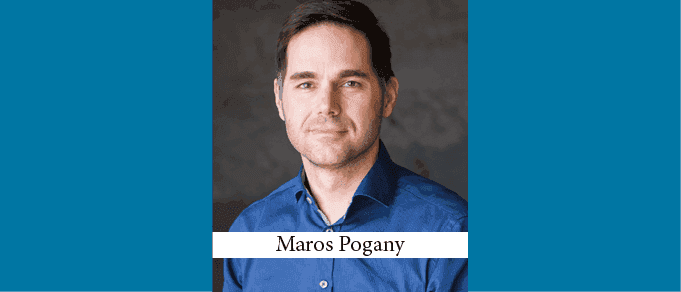Maros Pogany is the Head of Legal at KIA Motors in Slovakia – a position he has held for the past nine years. Before joining KIA in 2004, he spent over three and a half years as a litigator in private practice and one year as a lawyer with the Matador Automotive Group. He is a 1999 graduate of the Law Faculty at the Pavol Jozef Safarik University in Kosice, Slovakia, and in 2017 he obtained an MBA from the DTI University in Dubnica nad Vahom, Slovakia.
CEELM: Thank you for speaking with us, Maros. Can you walk us through your career, and tell us how you ended up at KIA Motors?
MAROS: After graduating from law school my obvious choice was a tire factory close to my place. But this job did not satisfy my hunger for legal experience so I accepted an offer from a local law firm, where I learned many things, both as a lawyer and a person. After passing the bar exam I ran my own law firm for a while. When Kia Motors decided to build a factory in Slovakia it caught my attention and I applied for job there – and this July I will have been there for 15 years. The initial years in Kia were very difficult and I survived thanks to my then-boss, a Korean-American lawyer who trusted me and supported my professional and career growth.
CEELM: What – other than your previous boss – has kept you there? What makes Kia such a good place to work?
MAROS: The beginning was tough due to cultural shock between Slovaks and Koreans. In addition, the construction site provided by the Slovak government was not cleared of land ownership issues, which eventually took six years to resolve. As I mentioned, I was lucky to have a boss who stood out. He was very ambitious and demanding as well as politically skilled. I learned a lot from him, and even now some of his traits are unachievable for me. What’s more, lawyers never get bored at Kia; there are always new things happening in the company and the legal department’s voice is carefully listened to (even though sometimes the business units do not like what we say). Over time Kia has established a generous remuneration and perks system which corresponds to the company’s high demands on lawyers’ output. Last but not least, some of my current and former colleagues have become my good friends, so while working I am spending time with my friends.
CEELM: Are there changes to the legal/regulatory regime in Slovakia involving your role and Kia Motors that you would like to see, or alternatives present in other markets that you would like to see tried in Slovakia?
MAROS: Typically, in Slovakia, guidelines stemming from EU directives are stricter than those directives actually require. This means more work for lawyers, and it results in a greater administrative burden for companies, including Kia Motors. Thus, taking into account the tax burden, availability of manpower, and other factors, Slovakia has become less attractive to do business in than its neighbors – especially the other Visegrad countries. Whenever I have an opportunity to speak with government people, I request that they not impose more duties on business than EU law requires.
CEELM: What does a regular day in the office look like for you?
MAROS: It is a mixture of various forms of communications. Almost every day I attend brainstorming meetings with other business units, discuss with members of our department how to handle issues assigned to us, and review and comment on various internal documents prepared by other business units where input by Legal is required. Checking and aligning of the legal department’s weekly plan of work and progress of projects based on the yearly business plan is also a regular part of my job. Lunchtime is a great opportunity for me to chat with other Kia managers so we can keep each other updated on our work-related as well as personal matters. A few days a week I devote time to reading blogs on people management, legal tech, and the like. I am happy that most of the time the legal department can do the job without major interference.
CEELM: How big is your legal department? How is it structured, and who do you report to?
MAROS: We are four lawyers altogether. This year that number will be increased to five – we are now looking for a suitable candidate. There is no formal structure in the department; we train our members so that everyone should be able to do everything. However, a certain level of specialization has naturally developed over time. Each lawyer supports certain departments or handles specific legal matters for the whole company. At the same time our senior lawyer allocates time on strategic & development issues, as well as standardizing legal documents, while the juniors are assigned mainly with operative tasks.
In our company, I report to a Korean coordinator, who is not a lawyer, and who is in charge of three different departments, including the legal department. He serves as an intermediary between me and the Vice President, although, depending on the situation, I am free to communicate with the VP directly. I have a collegial relationship with our General Counsel Europe, who is located in Frankfurt am Main. I am not his subordinate, but the legal department supports him when necessary; the same is true for the legal division of our headquarters in South Korea.
CEELM: In your many years with Kia, what was the largest single deal or project you worked on involving external counsel?
MAROS: Most of the deals are handled by our in-house lawyers. External counsel assisted us with the due diligence of land ownership of a site where our factory is located, which resulted in an amendment to the Investment Agreement between Kia Motors and the Slovak Republic. With this amendment the structure of the land acquisition deal was changed and the government gave further warranties so that Kia is safe from future claims by the former land owners.
CEELM: What’s the one most important lesson (on business, team management, etc.) that you have learned during your nine plus years of leadership?
MAROS: It is important to realize that nobody can see what’s inside other colleagues’ heads, meaning that we cannot assume or prejudge other peoples’ motives, thinking, or understanding. That’s why I must ensure that my communication is clear and comprehensible to others.
CEELM: You publish a series of articles on LinkedIn on the “Organization of Legal Function.” Why did you start doing this, and what sort of feedback have you gotten?
MAROS: So far, I have published just two articles. The first one deals with the “In-house or Outside Counsel” dilemma. In the second one you can read my take on the proper number of in-house lawyers in a company, calculated based on the yearly workload. The articles are excerpts from my MBA thesis “Organization of Legal Function for Innovative Companies and Start-ups,” so I have topics like legal KPIs, how to organize the legal department to foster innovation, evaluation of in-house lawyers, and so on, in the pipeline. During my MBA studies, I studied and considered various approaches to those topics and by writing articles I hope to provoke discussion. The feedback shows that heads of legal deal with similar issues regardless of the type of business, even in non-profit areas. I plan to publish more articles, but after my second son was born it is not a priority for the time being.
CEELM: On a lighter side, what one bit of advice would you give to junior lawyers or recent law graduates?
MAROS: To all juniors, not only lawyers: Start small, aim high, and keep going.
CEELM: Finally, what’s your favorite place to visit in Slovakia, and why?
MAROS: My family likes swimming so we like Piestany, a city famous for its spa. Or to have a walk in the beautiful Sulovske Skaly hills, ending with eating the traditional Bryndzove Halusky meal in some of the cosy chalets.
This Article was originally published in Issue 6.4 of the CEE Legal Matters Magazine. If you would like to receive a hard copy of the magazine, you can subscribe here.

















